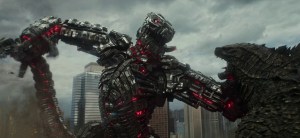Stories of private investigators or detectives being the only ones to see through a cloud of confusion to uncover the truth behind a mystery have been popular on film for decades, but in the age of information and the vastness of the internet, it seems as though anyone can find clues to support even their most outlandish theories. In the new film Wander, star Aaron Eckhart brings to life a character who believes he can uncover the truth, regardless of the lengths that other people are going to in hopes of keeping these “truths” hidden. This required the actor to not only tap into an all-new manner of thinking, but also ground the character in reality, all at a time in which real-world conspiracy theorists have ignited dangerous situations.
Videos by ComicBook.com
In the film, after getting hired to probe a suspicious death in the small town of Wander, a mentally unstable private investigator becomes convinced the case is linked to the same “conspiracy cover up” that caused the death of his daughter.
ComicBook.com caught up with Eckhart to talk about the new film, connecting the “dots” of reality, and collaborating with his co-stars.

ComicBook.com: The concept of the private investigator setting out to uncover a mystery all alone has been popular in film for quite some time, often taking the noir approach, though Wander is more of a neo-noir. When approaching this formula, were there specific influences from the history of this noir concept that influenced your approach?
Aaron Eckhart: Well, you’re going deep. You’re giving me way too much credit. However, I did graduate from film school, so I do know what that means. I don’t know, but let me think about it now. Double Indemnity comes to me right off the bat.
I like the idea that you never know what’s going on, like a guy can’t trust anybody. Tommy Lee’s (Jones) your best friend, or Jimmy, and then he screws you in the end, and I liked that. I liked the fact that noir always puts you on the outside. We’re in this little town in New Mexico, (my character is) living in an Airstream, and he’s living out in the middle of the desert, and he’s dealing with grief, and he’s dealing with pills, and he’s basically ostracized himself from life. But there’s something inside this guy that’s telling him that something’s not right. Everything’s not as it seems. This car crash that took away his family was not a natural event. It was manufactured. Somebody did this, but I don’t know why, but I’m going to get to the bottom of it. And everybody thinks I’m crazy for thinking this.
See, that’s the great thing about Arthur. Everybody thinks he’s nuts. They want to take care of him. They want to coddle him and say, “Oh, Arthur, it’s okay.” But no, no, no, no, it’s not. This actually happened. I’m going to go find out why. And he stands up to it and he finds a bigger conspiracy. He finds that they’re actually putting nanotechnology into people to control them and ultimately to kill them. And it took Arthur to stand up to that matrix. I love that about the movie. I love that he’s a lost soul, but he’s a warrior. That’s what I like about it.
In terms of noir, you’d have to make that case yourself. I don’t know about that. But the detective, in itself, is a fascinating character, because he looks at things differently than people. He looks at loose ends differently. He connects the dots differently. Where people don’t see dots, he sees dots. And that’s another thing about conspiracy theorists, they see dots. And people say, “There’s no dots there.” And he goes, “Oh yeah, there is. Look, this one goes to this one, goes to this one, and it means this.” And they go, “I can’t see any dots.” And then they call them names, right? Then it’s not until he wraps it up, Colombo style, where he goes, “Oh my gosh, there were dots everywhere and I didn’t see them and it took you to show me and now my life has changed.” And that’s what this movie is about.
I like how you put that, that your character “sees the dots” instead of just calling him a conspiracy theorist. It’s a slippery slope in the real world between seeing dots that are there and ignoring truths just to find the dots that support a dangerous theory, did you find it easy to tap into such a mindset?
Well, dots are basically instincts, right? I mean, dots are your body speaking to you or that thing in your ear or your five senses speaking to you. So a dot is actually not a dot, a dot is, “I’m getting a feeling about something.” And feelings can be crazy things; especially if I said to you, “I got a feeling that such and such is going to happen,” and it’s a big, global event or whatever. You don’t see any indication of that happening. Then you’re going to think a certain way about me, right? That’s what Arthur’s going through on a daily basis.
Now, let’s put the onus on me and say I tell you that there’s a global event that’s about to happen. And there’s no indication that a global event is happening. How frustrating is it to me to know the truth, and to feel that truth strongly, and tell my friend, and my friend thinks I’m crazy and that I know it’s going to happen. And then when it does happen, imagine those people that know things but are living in agony because their body is screaming out to them the truth? And yet nobody will believe them.
That’s where Arthur’s at. Arthur’s body is screaming at him saying “This is not natural. Something is going on here,” but nobody will listen to him. And then what are the side effects of that? Popping pills, taking drugs, alcohol, perverse behavior, all this sort of stuff, sleeping in. I don’t know, pick your medicine. But the reason why they do these things is because they’re trying to quell that inner struggle, and that’s where Arthur’s at. And he’s also dealing with grief and the fact that he caused that. I mean, what dad is not going to go through an accident like that and say, “Hey, it was my fault. I killed my daughter.” So there’s a lot of things going on in Arthur’s head and that’s what was interesting as an actor to play.
Do you remember the specific moment or element of this movie that made you want to get involved in it? If it was a specific moment in the script or meeting the director or something?
Well, when I read the script and he’s living in an Airstream in the middle of the desert, I said, “That’s me. Sign me up.” I said, “I’ll actually use that as my house.”
The imagery in the script and, obviously, in the movie is fantastic. I love it. I loved it. I loved playing it. I loved being there. April (Mullen) made this movie different for me in the sense that I’ve never had a director that has taken care of an actor like this. This girl was amazing to me. She made it possible for me to be Arthur. She loves Arthur. She calls him a “silent warrior.” She loves me through Arthur. She put me in a house in the middle of the desert. We had a Native American tribal chief come out, and his son, with a drum. And we did a prayer before, and dance to commence the film, and the whole crew was there and everything on our first day in the morning. And then she, unbeknownst to me, made a little speech. And she said, “You guys, you don’t talk to him.”
And, inside my head, I was like, “Whoa.” She’s like, “Nobody here talks to him.” I didn’t know she was going to say that. That’s my dream. That’s an actor’s dream. Not because you don’t want to talk to people, it’s because you’re in your character and Arthur’s afraid of people. Arthur has ostracized himself because of his inability to be with people. Now, of course, I talk to people. I don’t want to make this outrageous. I’m saying, what April did for me by giving that speech, she gave me freedom. She gave me the freedom to not come up with a joke that day or to not get into conversations with people because I had to use my energy elsewhere, toward the character and toward the film. And I really appreciated that. She just was fantastic.
You star with Tommy Lee Jones in the film, and he has such an intense reputation and is an icon, what was it like collaborating with him? It dawned on me at one point that you had both starred as different versions of Harvey Dent so I couldn’t help but wonder if that ever came up between you two.
It did come up, but not between us. Somebody else said it. Tommy and I actually didn’t talk about that. But I mean, there’s only so many Harvey Dents in the world and you’ve got two of them in this movie. And see, I don’t know if it makes us a complete face or now we have four faces.
But, Tommy is, as you said, he’s an icon, and he’s an Oscar winner, and he’s a legend in our industry. And I have “mucho” respect for him. It’s actually my second time working with Tommy; I did a little part in Ron Howard’s The Missing. And I did a couple of scenes with Tommy in that, but it was great. As soon as he put on those yellow glasses, I was like, “There’s Jimmy right there. Let’s go.” And it didn’t take long, obviously, because Tommy is a pro and he knows what he’s doing. It was really effortless with him and I enjoyed being with him. I enjoyed the process. I enjoyed looking at him as a character and what he brought to the movie.
*****
Wander hits theaters, On Demand, and Digital HD on December 4th.









